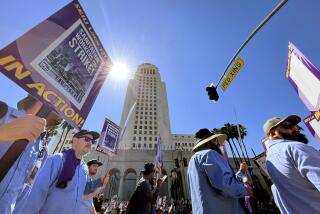As a Factory Falls, Memories of What It Means to Have a Job
- Share via
It was bound to happen; another American factory is falling to the wrecking ball. Once the dust settles, all that will remain of Lockheed Corp.’s A-1 North plant in Burbank will be rubble and, for many Valleyites, memories, especially of World War II and the Cold War when this manufacturing giant employed thousands of folks. I was among them.
It was the 1950s. I was a single mother (divorced) trying to hold it together with odd jobs: a dry cleaners and a ceramics factory. Forced to move back in with my parents in Pacoima, daily I scoured newspapers for a better job. A clean, secure job, preferably in an office (I wanted to wear white gloves!). Although I read and wrote English well enough and had some business skills (filing, typing), few office jobs were open to Mexican American women. Regardless of how “clean-cut” we looked in our one good blouse or how fast we typed, few of us were hired.
It was the same for men, although not during the war years, when airplane factories in Southern California had to hire any and all able-bodied persons to build the planes crucial to the effort overseas.
*
Working for Lockheed gave folks status. Not only did the company pay its workers well but it also provided great benefits, including health insurance that covered everything from the removal of a wart to childbirth. This was a plus for poor folks who often relied on home remedies.
During the war years, Lockheed operated three shifts: day, evening (or swing shift) and graveyard. Many of the workers were women: daughters, sisters, wives, mujeres who for most of their lives had depended on men. Many had never earned money. Middle-age ladies found jobs at Lockheed, and men with military deferments taught them how to use rivet guns. The consensus was that girls who could follow a recipe could learn to read blueprints. And they did.
Women were told to wear closed-toe shoes and pants when working in certain areas. Cotton overalls (mostly in blue) sold like crazy at JC Penney and from the Sears catalog. Women also had to keep their hair tied back or in a net, as it might create a hazard; some wore a contraption called a snood. Muy sexy!
Many men liked to work the graveyard shift; it gave them time for other things. But women scheduled work hours around their children’s school day. Like all good Mexican mothers, most worked the day shift because it ended at 3:30 p.m. They had time to stop at the market then rush home to cook dinner.
*
Being a Lockheed employee gave folks security and the means to buy automobiles, refrigerators and the ubiquitous bedroom sets that indicated we had arrived. The American dream of home ownership (nothing down!) became a reality for blacks and Latinos. Bedroom towns literally sprouted along San Fernando Road, all the way to Los Angeles. Panorama City had the prettiest tract homes.
I last worked at Lockheed in July 1962. I had remarried and went on maternity leave. At first I missed the camaraderie of friends and, more so, the money. When I had needed a steady, well-paying job, Lockheed saved me and many others from the welfare rolls. And for that I am eternally grateful.
More to Read
Inside the business of entertainment
The Wide Shot brings you news, analysis and insights on everything from streaming wars to production — and what it all means for the future.
You may occasionally receive promotional content from the Los Angeles Times.










